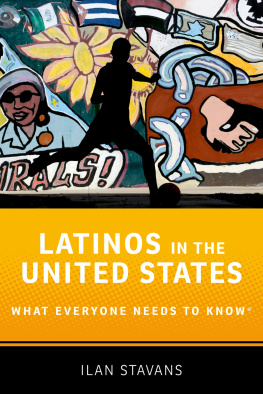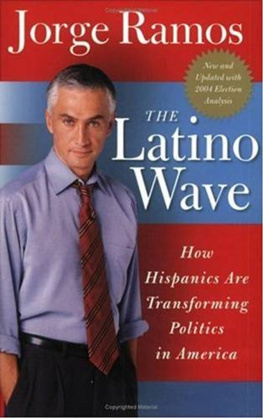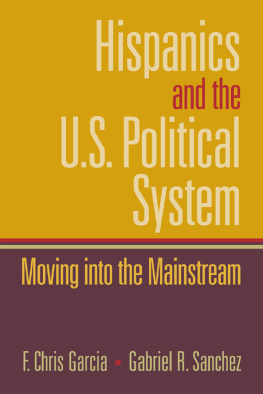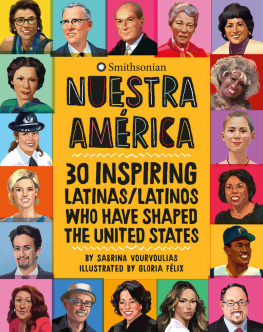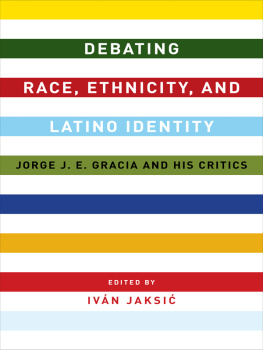Published in 2000 by
Routledge
711 Third Avenue,
New York, NY 10017
Published in Great Britain by
Routledge
2 Park Square, Milton Park,
Abingdon, Oxon, OX14 4RN
A Member of the Taylor & Francis Group
Copyright 2000 by Routledge
Design: Jack Donner
All rights reserved. No part of this book may be reprinted or reproduced or utilized in any form or by any electronic, mechanical, or other means, now known or hereafter invented, including photocopying and recording, or in any information storage or retrieval system without permission in writing from the publishers.
Library of Congress Cataloging-in-Publication Data
Hispanics / Latinos in the United States : ethnicity, race, and rights / edited by Jorge J. E. Gracia and Pablo De Greiff.
p. cm.
Includes bibliographical references (p.) and indexes.
ISBN 0-415-92619-X (acid-free paper) ISBN 0-415-92620-3 (pbk.: acid-free paper)
1. Hispanic AmericansEthnic identity. 2. Hispanic AmericansRace identity. 3. Hispanic AmericansCivil rights. 4. United StatesEthnic relations. 5. United StatesRace relations. I. Gracia, Jorge J. E. II. De Greiff, Pablo.
E184.S75 H627 2000
305.868073dc21
99-048696
Publisher's Note
The publisher has gone to great lengths to ensure the quality of this reprint but points out that some imperfections in the original may be apparent.
H ISPANIC / L ATINO E THNICITY, R ACE, AND R IGHTS | |
An Introduction |
The purpose of this volume is to address some fundamental issues that concern Hispanics/Latinos in American society today. The number of Hispanics/Latinos is increasing at a fast pace. According to recent figures, we already constitute the largest minority group in the country. By the year 2050, it is expected that our numbers will be greater than those of all other minority groups combined. This means that our presence and impact on American society cannot be ignored. Our values, views, and rights must be taken into account by the American population at large. But Hispanics/Latinos do not appear to be homogeneous. We differ in terms of origin, race, language, religion, political affiliation, customs, social altitudes, physical appearance, economic status, education, class, and taste, among other things. This raises questions about both our identity and our rights. Do we really constitute a group? Do we have rights as a group or just as individuals?
The essays collected in this volume represent the efforts of a varied and interdisciplinary group of scholars to come to grips with some of these pressing issues. Although the government generally defines Hispanics/Latinos in ethnic terms, the category is often used racially. One of the central unifying threads in this volume, then, is the relationship between Hispanic/Latino identity, on the one hand, and ethnicity and race, on the other.
The questions arising from this first concern have major political implications not just for Hispanics/Latinos but also for all citizens. Hence, the second major unifying thread in the collection is the relationship between different concepts of the Hispanic/Latino identity and other social and political issues, especially those concerning rights.
Needless to say, there is no hard-and-fast separation between the themes explored by the essays in the two parts of the collection. Indeed, these essays share a significant area of overlap, namely, the discussion of identity. But they are also related in many other ways, for they are the fruit not only of common concerns, but of intense discussion. Of course, any principle of organization emphasizes some issues and neglects others. At least two other principles of organization could have been easily used: the relevance of history for the understanding of the condition of Hispanics/Latinos in the United States, and the importance of relational accounts of identity in conceptualizing who we are.
After providing a sketch of the contents of the two parts of this volume, this introduction will discuss briefly some of the underlying tensions between the positions defended by these authors, and will attempt to locate their discussions in the broader context of contemporary social and political philosophy.
Part 1: Hispanic/Latino Identity, Ethnicity, and Race
One of the unifying threads of this collection is the question of the status of the Hispanic/Latino category. Is it an ethnic category, a racial category, neither, or both? In the first part of this volume six papers make the question of the relationships between Hispanic/Latino identity, ethnicity, and race their central concern.
In the opening essay of , Linda Alcoff considers three alternative ways of dealing with the question of identity in relationship to the racial categories dominant in the United States. One possibility is to assimilate to the individualistic ideology pervasive in some circles in the United States and to reject the salience of group identities. This strategy, according to Alcoff, is the one that dominant groups in particular prefer, alleging that the obsession with group identity is a result of the benefit-seeking generated by welfare programs. But this, for Alcoff, gets the history backward. She points out that in emphasizing group identity, ethnic and racial groups are merely giving value to categories that were originally imposed on them, and trying to have a hand in the construction of their own identities. Alcoff also provides an illuminating explanation of the sensitivity of dominant groups to the affirmation of group identity on the part of non-Europeans: whereas some European ethnic groups can claim redress for discrimination, the claim raised by non-Europeans in the United States is often much more radical, targeting the country's legitimizing narratives. After all, these identities remind dominant groups of acts of brutalizing slavery, of the violent appropriation of land, and of the forced extinction of whole cultures and traditional ways of life.
Another strategy for conceptualizing the Hispanic/Latino identity consists of rejecting racialized designations and insisting that Hispanic/Latino is an ethnic label. This attractive strategy can be supported by attending to both metaphysical and political considerations. As to the former, it appears that Hispanic/Latino is a category that encompasses not just many nationalities, but many races as well. An ethnic understanding of the category seems to capture what ties the members of the group together, namely, some combination of common language, a shared history, a common ancestry, or different historical and cultural factors. Politically, insisting on an ethnic understanding of the Hispanic/Latino category obeys the same rationale that motivates the corresponding move in favor of the ethnic label African American in the case of blacks. This move is defended by arguing that it constitutes a rejection of essentialistic racialization in favor of the use of a label that, in being connected to culture, confers agency on those who identify themselves in this manner. Both the denial of essentialistic racialization and the affirmation of agency are said to offer the possibility of reducing racism.



